Promoting cultural understanding one storybook at a time
Sitting at a small round table surrounded by children’s books about East Asia, CU student Valerie Lombogia reflects on the question she’s just been asked: “Do you have any meaningful or rewarding experiences you’d like to share from this program?”
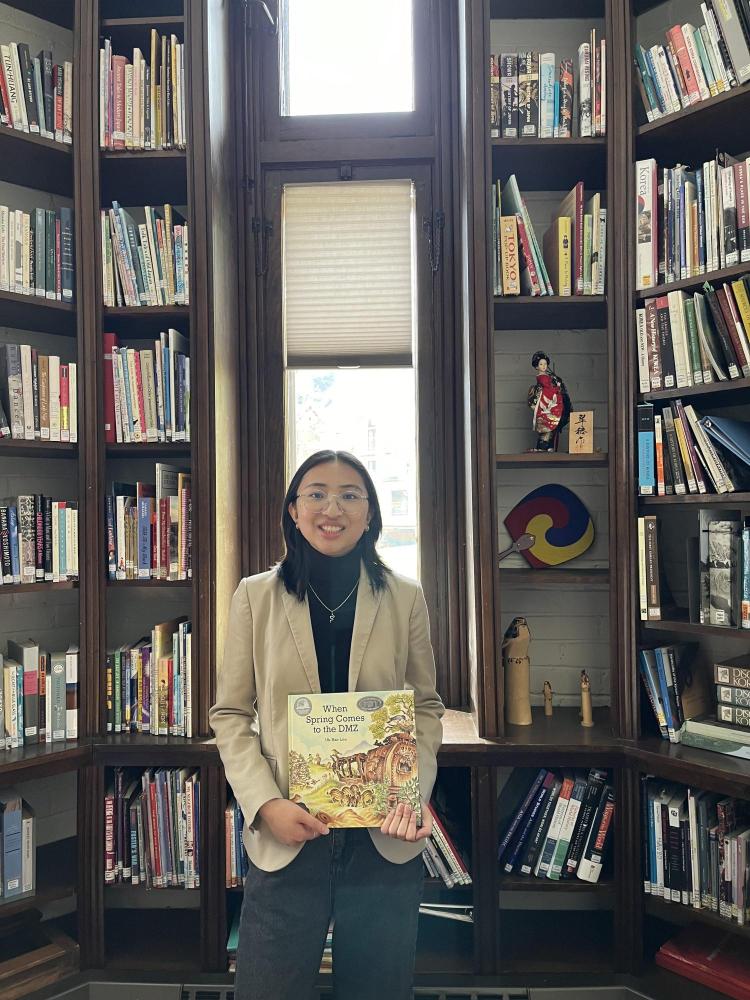
Valerie Lombogia showcases her assigned book after an online visit with a high school social studies class in Westminster.
After a moment, Lombogia answers.
In one class, there was a Korean little girl who was really excited to hear that we were going to be reading a story about North and South Korea. It reminded me of one of the reasons that I decided to apply to the Classroom Outreach Project, which was not only to teach students about Asia but also to help students who have Asian heritage to feel more represented in the children's books they read in school. As a child, I would have been absolutely delighted to even find a picture book related to my cultural background, much less have it read to the whole class, so I'm extremely happy to have helped even one student have that experience.”
It’s moments such as these that validate the reasoning for implementing the Classroom Outreach Project, an undertaking by the Program for Teaching East Asia (TEA) in the Center for Asian Studies. TEA’s goal is to enhance and expand teaching and learning about East Asia at the K-12 school levels, a mission almost 40 years in the making.
The project, titled “Teaching Natural Sciences through East Asian Picture Books,” was conceptualized by TEA program director Lynn Kalinauskas, who thought of using books with excellent cultural content about East Asia, including Freeman Book Award winners, to teach elementary natural science concepts. As part of the project, TEA hired six undergraduate students and a graduate student assistant to plan and execute storybook readings, lessons and activities using these books in classrooms across the Boulder-Denver metro area.
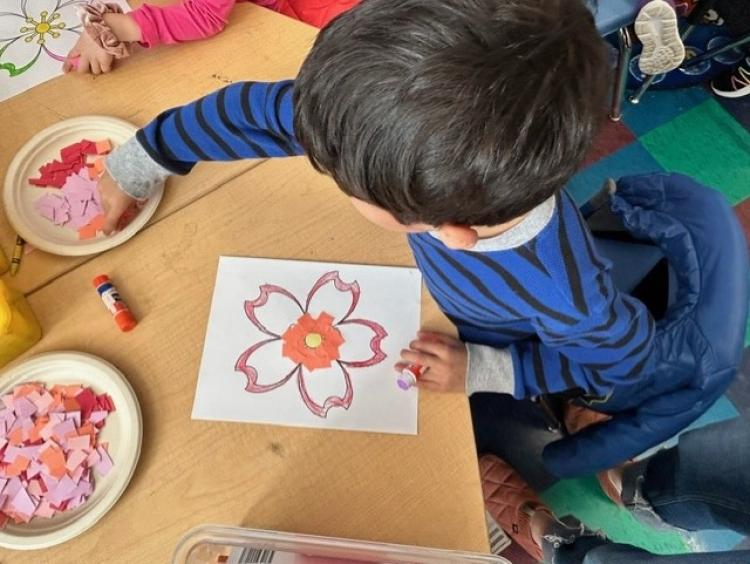
The students chosen for this project represent a wide range of expertise and interests. They are:
- Nori Catalano (Asian studies and art practices, 2024)
- Lily Elliott (Asian studies and evolutionary biology and ecology, 2025)
- Christy Go (doctoral studies in music education, 2027)
- Ashley Launer (English and Korean, 2027)
- Grace Lewis (molecular, cellular and developmental biology and Japanese, 2025)
- Valerie Lombogia (Asian studies, Korea track with TESOL, 2024)
- Nhi Tran (elementary education, 2027)
Whether the interest in this project came from their own ethnic and cultural heritage or their engagement in East Asia in general, these students have poured their energy, expertise and passion into creating informative, hands-on interactive lessons that have engaged students and teachers. Since January, students have visited 64 classrooms from Boulder to Aurora, varying from a two-room school of eight elementary students in Gold Hill to a library packed with 110 middle schoolers in Thornton.
Teachers have reported the project has been instrumental in exposing students to different cultures, highlighting the power of books to further cultural understanding and the impact of guests in provoking thought and connection.
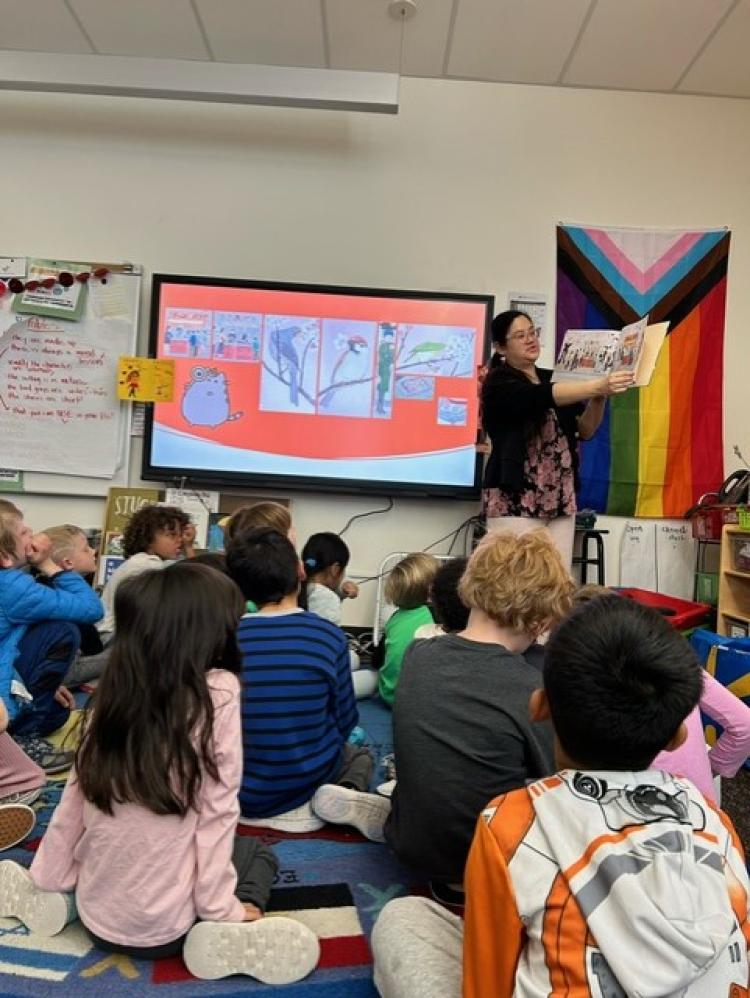
Christy Go, the program's graduate student assistant, plays a game of I Spy while reading to a class of first graders in Denver.
One teacher stated, “They were interested in the children's book, and it was novel to have someone other than their teachers sharing information with them. They've loved perusing the other picture books on their own since your visit, and I look forward to incorporating them into future science units to increase representation and diverse perspectives.”
Another highlighted how the presentation promoted critical thought and connection for her students: “The carefully chosen picture book prompted interesting reflections and questions. The artifacts enhanced children's understanding and appreciation of the topic. I appreciated how the presenter drew connections between the children's lives and the experiences of the protagonist of the story.”
CU students reflect on their experiences
Beyond the impact made on K-12 students, the CU student participants have expressed how the project has enhanced their skills in areas such as planning culturally responsive lessons, engaging in conversations about culture, increasing their own knowledge about East Asia, and public speaking.
Grace Lewis, one of the student presenters, spoke about how her presentation sparked interest and connection to Japan. “It was really rewarding seeing how excited the students got about Japan, so much so I had two girls at a table asking how to write words in Japanese. I loved making someone else as excited about the language as I am.”
Ashley Launer shared how the experience helped her to understand how to engage students through intentional slides: “The kids seemed to really like the slide that showed pictures of things related to the Moon Festival, so I'm glad I made that slide. I think having a lot of images in general helped the kids stay engaged and made the lesson more interesting.”
Lombogia echoed this sentiment in seeing how her carefully planned activities engaged students. “I was really happy with how they responded to the activities like the sounds of nature activity. They had a lot of really creative ideas for what the bird sounds and seal sounds could be, and I could tell they were really excited when they guessed the right answer.”
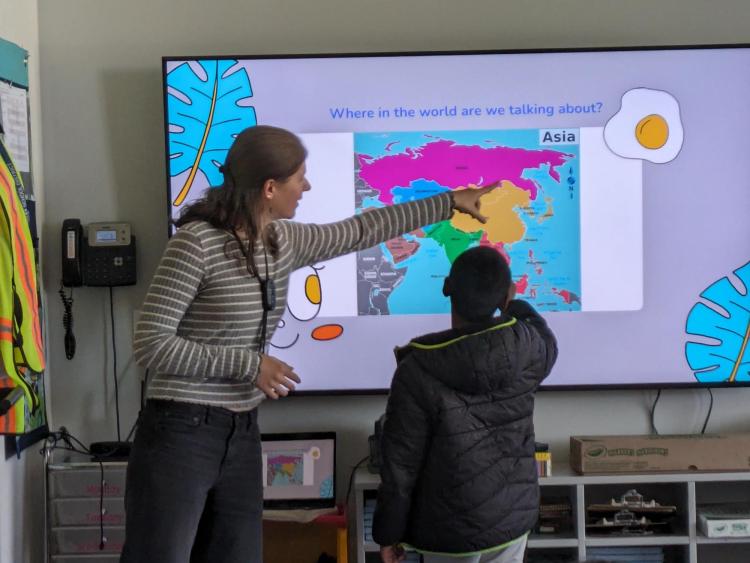
Ashley Launer engages with a fourth grader at a school in Broomfield.
For Nori Catalano, the experience was a unique opportunity to gain experience in creating and executing a lesson. “It was very rewarding to see the students respond so well to a lesson that I crafted and also see them so interested and engaged when I was reading the story. It is so much fun working with the students in the classrooms.”
For other students, the project was a validation of their passions and motivation for future goals. Lily Elliott shared, “Seeing enthusiasm for the natural world from younger people motivates me to go into research and conservation.”
Nhi Tran expressed how the project was a fantastic opportunity to gain experience in a real classroom and gain valuable feedback as an aspiring educator. “To hear that I am doing an amazing job has really uplifted me and confirmed that this is the right path for me. This feels like something I should’ve pursued a long time ago, and I am grateful that I got to experience that euphoric moment this week.”
As a former K-8 music teacher in Aurora, graduate assistant Christy Go made it a priority to be intentional in inviting guests into her classroom to highlight cultural bearers in the music being studied. She stated, “As someone now on the other side, and being that guest myself, it has been incredibly rewarding to see firsthand the impact we made on students and being part of that memorable experience.”
Meaningful representation: About the project
Drawing personal connections and understanding characters and situations in the books as a reflection of everyday life is important in promoting culturally responsive education. Even with the rise in popularity of Asian foods and popular culture in Colorado, a continued lack of understanding of the immense diversity and distinction between Asian cultures, countries and people persists.
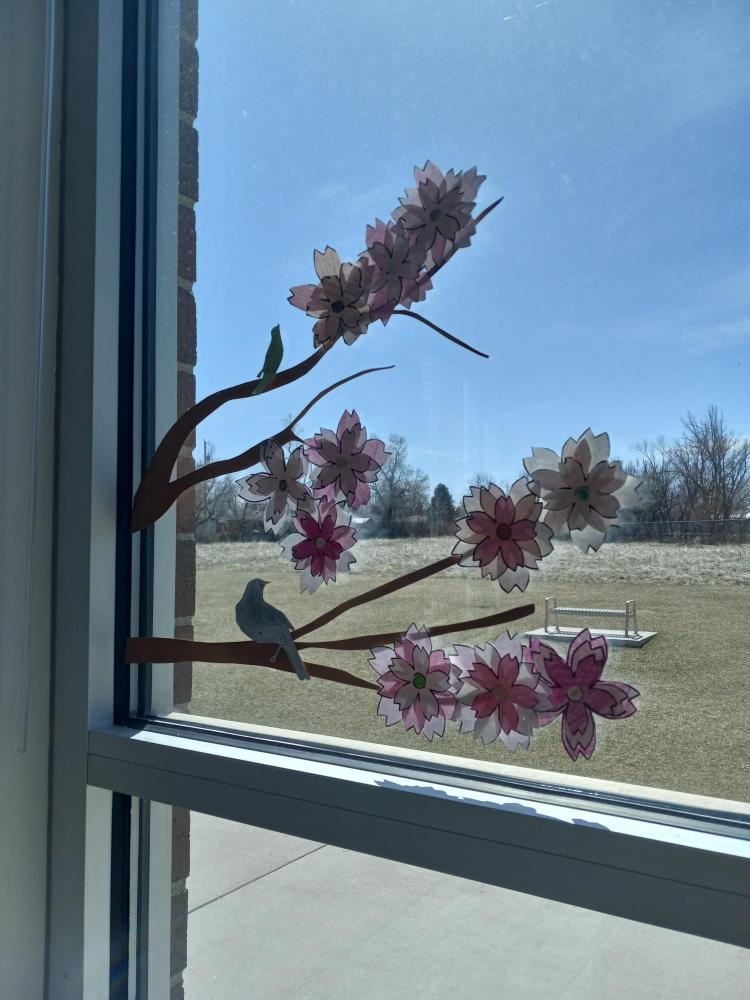
Lingering sentiments of anti-Asian hate that escalated during the height of the COVID-19 pandemic, coupled with lack of cultural distinction and perpetuation of stereotypes, contributes to misinformation and misunderstanding about Asia as a whole, impacting the growing Asian and Asian American community in Colorado. TEA’s hope is that projects such as this one can help to combat misinformation and promote empathy and equity, as well as contribute to meaningful representation for the East Asian communities in schools.
The project was sponsored by the Office of Public and Community-Engaged Scholarship, the National Consortium for Teaching About Asia, and The Japan Foundation, New York. The five books selected for the project were:
- “A Big Mooncake for Little Star” by Grace Lin
- “When the Sakura Bloom” by Narisa Togo
- “Moth and Wasp, Soil and Ocean” by Sigrid Schmalzer
- “Kai the Dancing Butterfly” by Crystal Z. Lee
- “When Spring Comes to the DMZ” by Uk Bae Lee
The TEA Classroom Outreach Project will continue for the 2024–25 school year with a new focus on “Teaching Geography Through East Asian Picture Books.” Learn more about the Program for Teaching East Asia.
Editor’s note: This story was written by Christy Go, doctoral student in music education and graduate student assistant at the Program for Teaching East Asia. Title image caption: Nhi Tran gives context before beginning her reading to a third grade class in Denver.


